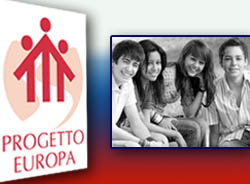

| Slovenia – Project Europe: The PUM programme for unemployed young people |
| RMG – Project Europe: Salesians in Slovenia |
| Slovenia – Project Europe: Skala, education for street children |
In the last twenty years Slovenian society has gone through vast changes which have deeply affected it.
To the process of democratisation, already begun in the 80’s, and the re-organisation of the country on new/different basic criteria and social, political and cultural models , have been added the changes produced by the digital revolution with the corresponding attitudes individualistic, consumeristic which are always gaining more ground.
From a situation in which little more than 20 years ago in order to have a simple packet of coffee you had to go abroad and become a smuggler, nowadays Slovenia is experiencing the totally opposite situation: there are innumerable supermarkets full of all the goods you could possibly want … Perhaps it is not a simple success story. The packed shelves in the supermarket lead to a different way of thinking, a different way of looking at the world and at oneself … This is not a scientific discovery, but from everyday life one can see that something is happening within the minds and hearts of people, of the young; even though it is difficult to define.
However there are some Government statistics from 2010 which in some areas show the situation of the young. Here are some of the details.
Future demographic changes
According to some forecasts, between 2010 and 2020 the number of young people between 15 and 29 years of age will fall by 20%. In 2050 the number of the elderly over 65 years of age compared with the young people will be three times greater than at present. Many young people consider the ageing population a serious problem and 40% of young people think that in Slovenia the elderly are treated better than the young.
Education
In the last decade the percentage of young people who study is higher than the European Union (EU) average; in 2008 the percentage of young people between 20 and 24 engaged in studies was the highest in the EU, and in the previous year, also in relation to the rest of the EU, Slovenia was the country with the lowest percentage of school drop outs.
Digital and social life
82% of young Slovenes use the internet at least once a day.
The number of young people smoking is falling slightly but the number of those experimenting with alcohol and drugs has increased.
In the decade 2000-2010 the number of young people between 25 and 29 who were still living with their parents has increased by almost half rising from 44.4% to 66.2% of the total.
Religious spirit and practice
A long-term tendency of a moderate decline has been noticed. Most of the young people say they are Catholics, but overall the figures show a decline in the numbers of these: from 72% in 2000 to 66% in 2010. About one in four young people claims to be an atheist (in 2000 they were slightly more than 1 in 5). Among other faiths, such as the Orthodox and Muslims each with about 3.5% of the population and the Protestants with slightly more than 1%. In addition about 1.5% of the population say they belong to other religions.
The survey also asked the question about attendance at church and taking part in services; 4.90% replied that they attended every week and 23.50% several times a year.
In response to the question “How important is God in your life?”, on a scale from 1 to 10 young Catholics said on average 4.17 while it was 6.20 for young Muslims and 5.49 for Protestants.
Values
There have also been slight changes with regard to the values in which the young Slovenes believe. The comparison is again between the 2010 survey and the previous one of 2000. The values are expressed in order of importance and on a scale of 1 to 5:
In general there have not been great changes, but it can be seen that the interests of young people are focused on everyday matters, which have an immediate impact on their lives. Noticeable also is the emphasis on individuality and competitiveness as strategies to face the uncertain and likely to change social situations in which they find themselves.
In addition from an overall point of view there can be seen a real decline in interest in the great social and collective issues (politics, the faith, work) in favour of more personal issues (such as the family, friends, free time). In comparison with 1992: politics (-17,2%); faith (-8,9%); work (-8,6%); family (+1,9%); friends (+7,2%); free time (+9,9%).
Published 01/08/2012
